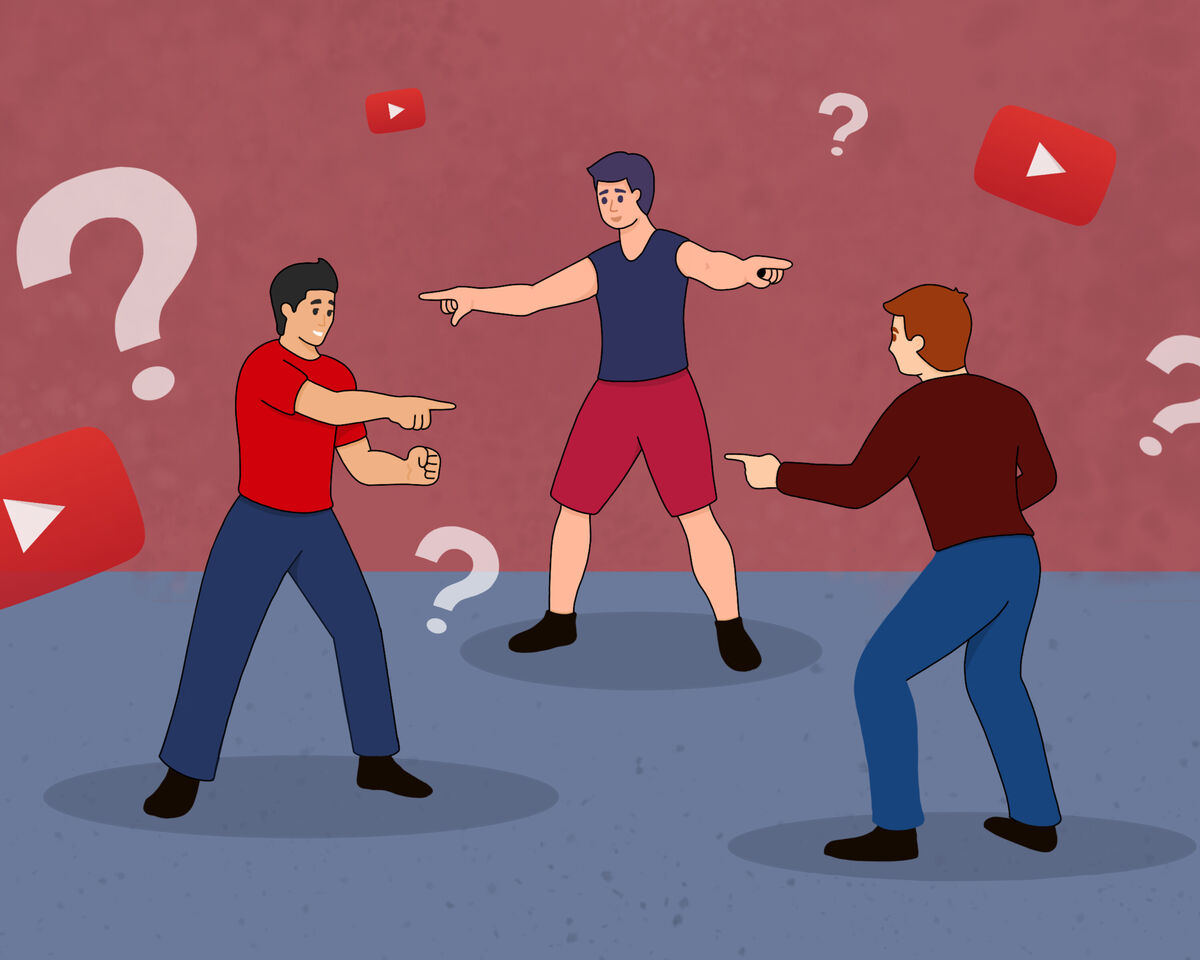How To Improve Your Communication Skills For Effective YouTube Vlogging!

Do you remember the moment when the idea of starting your own YouTube channel came to you? Most likely, you thought that you have a good understanding of a certain topic, and you have something to say and show. Experience has demonstrated that only a small fraction of novice and even seasoned vloggers pose the fundamental question to themselves: "Do I possess proficient speaking skills?"
Of course, we have a wealth of experience in conversations. We tell our friends and family stories on a daily and regular basis, give presentations at school, university, and work. But it's not the same as speaking in front of a camera. Many people underestimate how effectively, clearly, and beautifully they convey information, and this can lead to negative comments or a lack of views.
In this article, we won't delve into serious speech defects, as they require professional help. Instead, we will focus on how to develop clear diction, make the recording process easier, and leave viewers with only positive impressions after watching your video.
Identifying Challenges in Your Speech for Improved Communication
Through everyday conversations with a friend, you might not gain much insight. You discuss engaging topics, and you don't even think about constructing a coherent dialogue. However, you can always approach your conversation partner with a question. Tell them what you plan to broadcast on YouTube and ask them how they would assess your speech. Could they listen to you not only during a conversation but also through a computer screen?
Just remember to ask questions to people who won't discourage you entirely from starting a vlog. The criticism should be constructive—your conversation partner can point out mistakes, but they shouldn't resort to insults like "you mumble," "you're boring," and so on.
The second way to evaluate your abilities is to sit down and record a video. Choose any topic you're ready to discuss on camera. Try to be as natural as possible at that moment. Avoid preplanning your phrases to avoid making mistakes. Our goal is to make mistakes and understand what needs improvement.
When it comes to assessing your speech, it's impossible to choose just one method. Talk to different people, listen to different opinions, watch videos, and show them to someone you trust. One person may be biased, and we ourselves may watch our video and decide that it's great overall. So, use all available means.
Getting rid of filler words
Let's imagine that you've assessed how challenging your speech is. Maybe you've realized it on your own, or perhaps your viewers have pointed it out. The key is not to lose hope. People who deliver TED talks weren't born as natural speakers either. Believe me, 99% of the participants spent years working on sounding confident and dignified.
The first piece of advice concerns speech clarity, which most people struggle with. In written communication or everyday conversation, we don't notice how often we use filler words like "basically," "by the way," "kind of," "like," "so," and "well."
Habits hold significant sway, inevitably permeating casual conversations and often leading to discomfort in formal settings where constructing a coherent sentence becomes a challenge due to an overreliance on filler words. However, it's crucial not to succumb to despair or abandon the prospect of vlogging. This issue can be addressed and resolved.
What do experienced vloggers do?
- Write scripts and use prompters
- Think carefully about phrases before speaking
- They apply the art of editing, cutting out all the bad moments
In an ideal world, before recording your first video, you'll need 7-10 draft versions on various topics. This is necessary to assess the quality of your speech, get used to speaking in front of the "all-seeing eye," find the right angle, note any less successful gestures and facial expressions. Meticulous preparation is key to pinpointing and rectifying any weaknesses prior to venturing into the YouTube sphere.
How to deal with poor diction
What do we categorize under this ambiguous term? Well, everything that might confuse you or your viewers. Let's divide it into three types: monotonous, fast, and unintelligible speech.
- Speech is too monotonous
You've probably encountered teachers whose classes or lectures made you want to fall asleep and nothing more. If you sense a similar vibe within yourself, you either need to choose a suitable topic, such as something calming or relaxing like ASMR. Alternatively, you can opt for topics that don't require voice recording, or work on your intonation.
Injecting emotion and emphasizing phrases can dramatically transform your delivery. Take a sentence from a book, a lyric from a song, or a line from a poem, and practice modulating its intonation. Express it with varying emotions and intentions. For instance, consider the query, "Am I free? Like a bird in the sky?" and imbue it with profound surprise. The shift in tone can breathe new life into the words, making your communication more dynamic and engaging.
If these suggestions appear trivial or even amusing, be reassured: the daily routine for TV or radio broadcasters commences with tongue twisters. Whether silly, humorous, or downright absurd, these exercises yield substantial benefits.
- Talking too fast
And this, by the way, is one of the common problems that gaming channels face. Sometimes, creators try to convey the dynamics of the video through accelerated speech, but the result is often incomprehensible.
Remember: speed is good when you're on a game show. On YouTube, people come to relax or learn something. Your speech should not be fast but easy to understand. For those who need it, there's a fantastic feature - playback speed adjustment.
But what if you naturally speak fast in your everyday life? You also need to record yourself on camera and evaluate the result. When speaking very quickly, we tend to produce excess saliva that might go everywhere if not addressed. So, take care not only of understanding between you and your viewers but also of the aesthetics of the frame. If there's something your viewers should get lost in, it's only in the content's quality and a great mood.
Place a walnut or a wine cork (for legal drinking age individuals) in your mouth, hold it between your teeth, and start reciting the simplest tongue twisters : “I saw a kitten eating chicken in the kitchen” or “I scream, you scream, we all scream for ice cream”
Additionally, make a concerted effort to monitor your speech daily. This task may seem daunting—a "hard" level challenge—but with a focus on the end goal, the effort is necessary. Catch yourself when your speech accelerates. Ensure you're breathing adequately to support your words.
Consider the psychological aspect as well: maybe you're afraid you won't have time to say something important, and you'll be interrupted? Or listen to whether your conversation partner even has a chance to insert a word.
- Slurred speech
It's important to note that we're not talking about speech defects like lisping, stuttering, dysarthria, or other types of speech issues. Additionally, not everyone is bothered by something like lisping, and some individuals may not want to eliminate it. In other cases, it's better to address these issues with specialists who can provide individualized programs for each speech defect.
Here, we are addressing issues like swallowing sounds or letters due to speaking too quickly, mispronunciation, or the use of words that are not clearly articulated, often referred to as "mumbling." It's when a person speaks as if they were mumbling to themselves, rather than directly to the listener.
These are issues related to self-doubt and insufficient effort during school years. For example, you may have disliked learning poems, avoiding both reading and memorization. But now, the focus should not be on feeling bad about it. We always concentrate on the present and ask ourselves, "What can I do now to improve the result?"
Naturally, the primary focus should be on bolstering self-esteem. If nerves persistently affect the quality of your speech, tongue twisters or other exercises alone won’t suffice. While these practices are valuable and significant, they won’t address the underlying issue, which won’t simply vanish without targeted efforts to enhance confidence.
If we are not talking about deep and serious psychological traumas, it's important to start stepping out of your comfort zone.
Public speaking will make a significant contribution to your development. If you are still in school or university, seize any opportunity to gain as much experience as possible. Give presentations, participate in conferences, speak more often at the board, and develop your public speaking skills. Of course, it's scary. It's unfamiliar, but the more you do it, the more comfortable it will become to address an audience.
If you are not currently studying, look for opportunities to speak: book clubs, attending forums, different conferences.
This will be a significant advantage in combating self-doubt, help you work on your speech, improve your interaction skills with the audience, which will undoubtedly be useful for your future YouTube channel. It doesn't matter whether you speak offline or online; you need the skill to hold the audience's attention to grow your viewership and pique their interest.
Next, what we're talking about is specific speech practice. Whether you like it or not, it's important to return to the basics.
- Read more books. Enrich your vocabulary. Often, a lack of interest is simply because you haven't found the genre or author who could captivate you. Try exploring the genre of your favorite games or TV shows. There are probably comics, side stories, or entire books written about them. Start with that, and you'll soon find yourself engrossed.
- Incorporate speech training into your daily routine. Even just 5-10 minutes a day on tongue twisters will show significant improvements in diction within a month. What happens next?
- Work on your intonation. People prefer to hear calm, clear speech with organized thoughts. If you notice that your voice exceeds acceptable decibels or drops to the level of a 52-hertz whale, you need to work on this. Take control of your emotions, think through your speech, calm down, and restrain yourself.
- Develop your breathing. When speaking, you shouldn't gasp for air through your mouth; your nose should handle this. To ensure this doesn't happen, it's essential to practice breathing exercises, understand what the diaphragm is, and how it works. Ideal hobbies for working on your breathing include sports or singing.
How to communicate effectively on camera
Now let's discuss methods that will help you convey information to the viewer as effectively as possible.
Compose and Commit Your Script to Memory
For those who struggle with extemporaneous speaking, preparing and memorizing a script can be immensely helpful. Rehearse diligently and strive to deliver your content as naturally as possible—the interest of your viewers hinges on how well you prepare.
Yet, be mindful of the potential pitfall of this approach: delivering a memorized script in a monotonous tone can disengage and even deter potential subscribers. Viewers are drawn to authenticity—they want to see a genuine person, emotive and attentive to the words they're sharing. Therefore, you must either master the art of infusing your memorized text with a natural, conversational cadence or utilize a teleprompter to assist you.
Make a thesis plan
This is an excellent option for those who are not accustomed to learning anything and do not feel lost without preparation.
A thesis plan is the structure of your video with notes. You create a list of important things to talk about in front of the camera, and it must be in chronological order.
The main thing is not to digress from the topic, avoid unnecessary details, and maintain a good pace. You should have a clear understanding of what needs to be said in each segment and not lose the main point. This method is more suitable for those who already have experience in running a channel, being on camera, or even performing on stage.
Use a teleprompter
This wonderful device is suitable for almost every YouTuber. The exceptions are:
1. Vlogs where it's difficult to plan the script in advance, except for introductions and theses.
2. Gaming channels if your task is to come up with the script while playing.
3. Niches that, in general, do not require complex scripts, such as handmade, for example.
The cost of a teleprompter varies from $130 and higher. If you search on more budget-friendly platforms like Amazon, Temu, or Walmart you might find one for less.
Addressing the Issue with a Teleprompter, it may seem that a teleprompter solves all issues—you input your script, sit in front of the camera, and read. However, this "ingenious" tactic is not without its challenges.
First, your script should not merely be a text, but a captivating, conversational piece that avoids the tone of an academic thesis (unless that's your intent). It should resemble a heart-to-heart with a friend—well-crafted, coherent, potentially laced with humor and sarcasm, but ultimately, it should flow like a natural dialogue. Your viewers should be oblivious to the fact that you're reading; they must feel as though you're engaging with them directly.
Second, adeptly reading from a teleprompter is an acquired skill. It requires reading the text aloud multiple times—ideally thrice or more. Why? To ensure the delivery appears spontaneous, to grasp thoroughly the content you're discussing, and to pre-empt the necessary gestures and intonation.
We have likely touched upon all critical facets of speech and its cultivation. We've delved into prevalent speech challenges and identified strategies to facilitate video recording.
Bear in mind: your speech mirrors your personality. It is an integral component of your personal brand, one that resonates with a specific audience. A boisterous, piercing attorney can be just as off-putting as a droning Hollywood gossip commentator. Striking a balance between your niche and your self-representation is key. Strive for congruence between your true self and your passion.
You can do it!




